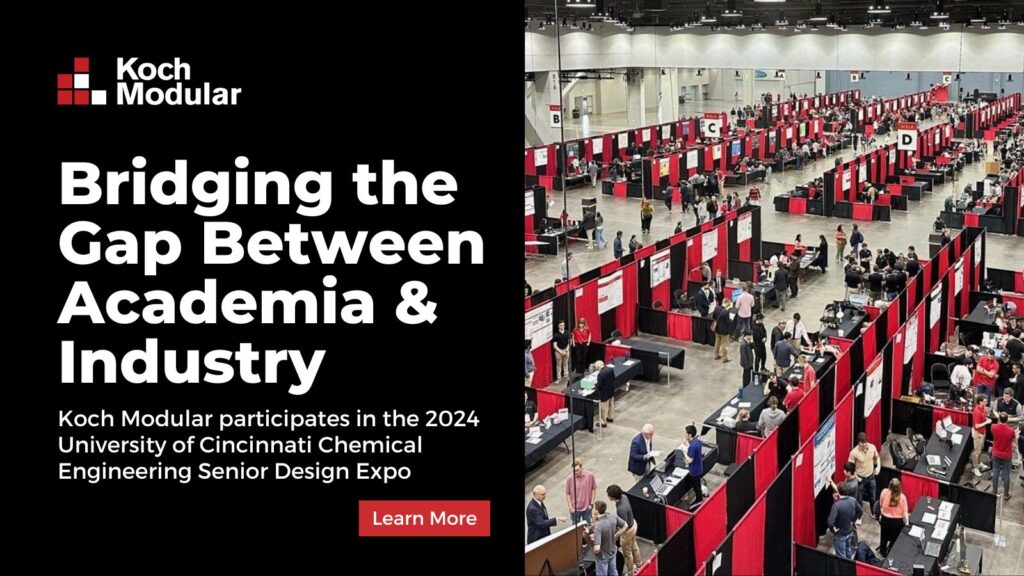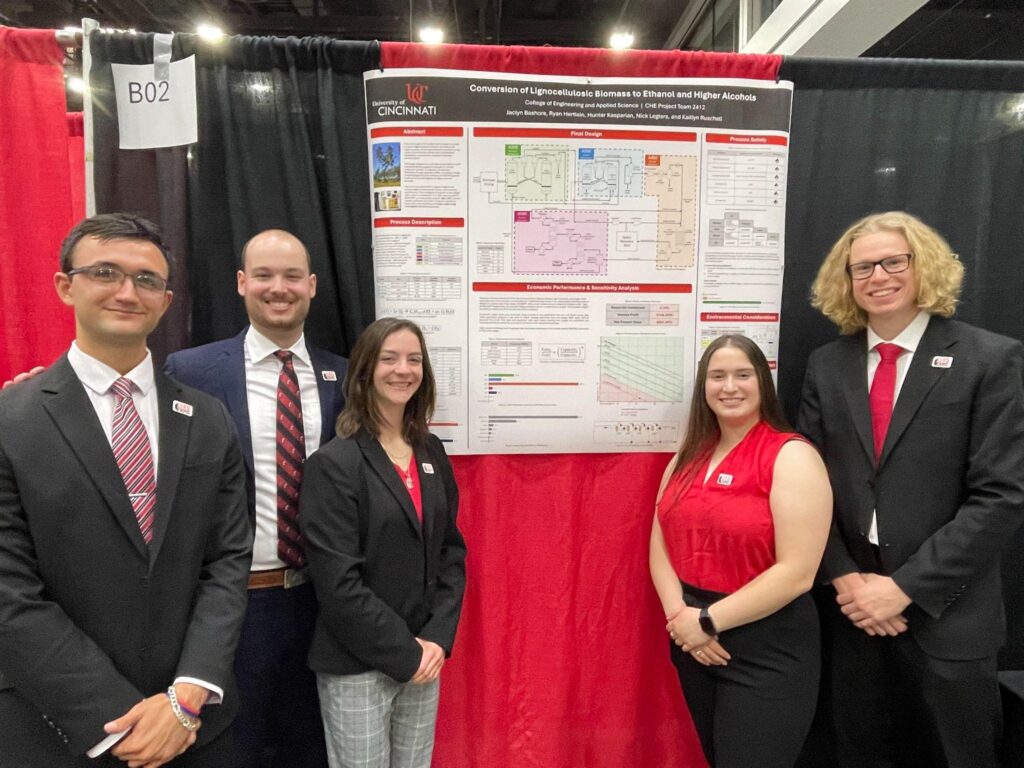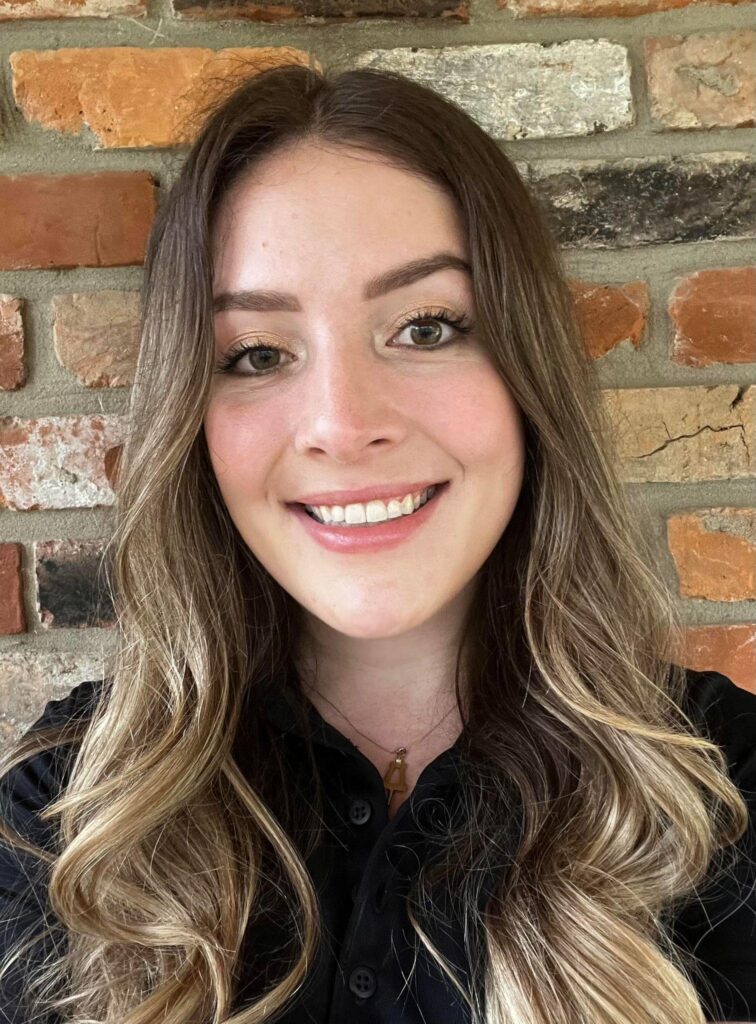Koch Modular Participates as a Judge at the University of Cincinnati Chemical Engineering Senior Design Expo
May 2024
/Category:Company Culture
Taylor Hembree, Process Engineer at Koch Modular, shares insights about her experience as a selected judge for the 2024 University of Cincinnati College of Engineering and Applied Science Senior Design Expo.

In the engineering world, bridging the gap between theoretical knowledge gained in academia and practical applications in the industry is crucial. Taylor Hembree, a Process Engineer at Koch Modular and a graduate of the University of Cincinnati (UC) College of Engineering and Applied Science (CEAS), brings a unique perspective to the table. Recently, she served as a judge at the UC Chemical Engineering Senior Design Expo, evaluating projects that represent the culmination of students' undergraduate education and cooperative education (“co-op”) experiences. In this interview, Taylor shares insights into her role as a judge, the importance of practical experience in engineering design, emerging trends, and the significance of events like the CEAS Design Expo in bridging academia and industry.
Q: Can you tell us about yourself and your role at Koch Modular?
A: I am a proud alumna of the University of Cincinnati, where I earned a degree in Chemical Engineering in 2018. I started my professional career as a Process Engineer, exploring the complexities of the Specialty Chemicals and Oil and Gas industries. Now, I work in the process engineering group at Koch Modular, where I've been involved in several projects, from proposals to detailed designs. It's been an excellent introduction to Koch Modular's approach to process design, and I've enjoyed it so far.
Q: What is the University of Cincinnati CEAS Design Expo?
A: The CEAS Design Expo is a platform for seniors to showcase their capstone projects. In the chemical engineering program, seniors begin this project in their final semester. They form groups of four to five and devote the entire semester to their project, including a poster and a technical design report. Prizes are awarded to the top three teams, adding an extra incentive beyond final grades.
Q: Why did you decide to be a judge?
A: During my time at UC, I found the senior design experience rewarding, as it provided me with the opportunity to combine my knowledge from the classroom with what I learned from my co-op terms. I always thought it would be enjoyable to participate as a judge in the future. Our design professor, Dr. Thiel, reached out a few years ago seeking additional judges, which immediately piqued my interest. Transitioning from being a student to a judge provided an intriguing shift in perspective. It allowed me to recall the challenges we faced during our design project, and I kept that in mind when reviewing the capstone projects.
Q: Can you share any experiences or insights from your career that influenced your approach to judging these projects?
A: My background before Koch Modular was primarily in the oil and gas industry, including five co-op terms at Marathon Petroleum. This experience provided me with a foundation in troubleshooting and optimization, and now, on the design side, enables me to approach projects from multiple perspectives. Something that may seem excellent in theory can potentially pose significant operational challenges in the field. Because of this experience, I can offer technical and practical lenses when reviewing the capstone projects.
Q: What specific criteria did you prioritize when evaluating the projects?
A: Because the poster presentations factor into the student’s final grades, there is established criteria provided by Dr. Thiel. However, beyond the rubric, I looked for groups that probed deeper into their projects. It's one thing just to take the problem statement at face value and process a certain amount of material per hour using a specific technology. I was particularly impressed by teams that went beyond the basics, exploring alternative technologies or leveraging their co-op experience in different parts of their projects. It's easy to stay within the confines of given guidelines, but those groups that explored unexpected avenues stood out to me.
Q: Can you highlight any trends or emerging technologies you observed across the projects that you believe will significantly impact the chemical engineering field?
A: This year, we noticed a surge of interest in carbon capture and green manufacturing. One team explored direct air carbon capture, while another collaborated with GE Aerospace on CO2 capture from jet engine testing. Some green manufacturing projects included urea synthesis, olefin production from sewer trap grease, and biomass to ethanol conversion. Alongside these, we encountered other unique projects, such as a food-grade vanillin production plant that creatively incorporated vanilla scents in the exhibit. The projects showcased a wide array of technologies, mirroring the broad scope of our work at Koch Modular.
Q: How do you perceive the role of events like the CEAS Design Expo in bridging the gap between academia and industry?
A: Events like the CEAS Design Expo help highlight the benefit of obtaining industry experience during engineering education. While some schools focus more on research, UC's engineering program emphasizes industry integration, primarily through its co-op program, which includes up to five semesters of full-time work at one or more companies. It is fascinating to observe students' projects and how they translate theoretical knowledge into practical solutions by leveraging their co-op experience.
Q: Looking forward, do you see Koch Modular attending more events like this?
A: Absolutely. It's a fantastic opportunity. I love seeing the creativity in the capstone projects and what the next generation of engineers is excited about! It’s also an excellent opportunity to network with other engineering professionals. We had a panel of around 15 judges, each with a different background and industry experience. I made new connections and learned more about other industries and some of the challenges they currently face with their processes. As a representative of the UC and Koch Modular, I am honored to be a selected judge for the 2024 event, and I am very much looking forward to what next year has in store.


Chat with Taylor
Taylor Hembree earned her B.S. in Chemical Engineering and MBA from the University of Cincinnati. She honed her process engineering skills at Marathon Petroleum Corporation, specializing in hydrotreating and catalytic reforming. Joining Koch Modular in 2023, she has contributed to various projects, leveraging expertise from proposal development to detailed designs.
Taylor Hembree, Process Engineer
